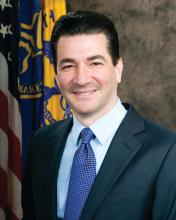Traditional cigarettes are addictive, and they kill. Now it appears that e-cigarettes, which electronically deliver nicotine in the absence of the lung-damaging smoke, might be a healthier alternative.
The American Cancer Society noted in June that, although the long-term effects of e-cigarettes are “not known,” they are “markedly less harmful” than traditional smoking. Sensing the changing tide, tobacco companies are going all in on e-cigarettes. And, as reported on CBS Sunday Morning, Dr. Gottlieb points out that in light of the impact of nicotine on the developing brain, a “strong regulatory process” is needed that puts new products “through an appropriate series of regulatory gates.”
Still, however, some people are dubious. The tobacco companies that are leading the transition are the same companies that once espoused the healthy benefits of smoking and suppressed counter information. Seeking greater profits, some products are marketed with enticing colors and flavors, with the goal of appealing to consumers – including teens. San Francisco has banned the sale of such products.
Dr. Gottlieb and others are quick to point out that what might be helpful for adults looking to quit also is enticing to teenagers. Using e-cigarettes would seem to be better than cigarette smoking. However, whether e-cigarettes are benign remains unknown.
Mental health takes center stage
An article in The Guardian by Tedros Adhanom Ghebreyesus, PhD, director general of the World Health Organization, and Lady Gaga, musician and cofounder of Born This Way Foundation, cited some sobering facts: 800,000 people kill themselves every year, a rate of six people every minute. Some are famous (Kate Spade and Anthony Bourdain). Others are not. But all leave people who love them and are often devastated by the passing.
For the 25% of people who will experience mental health issues during their lives, admitting their need for help risks being stigmatized, and gaining that help is difficult. This is changing; however, according to the article, funding for mental health constitutes less than 1% of global aid funding.
But there is cause for optimism. WHO is working with countries on a global action plan on mental health. Community-based mental health care initiatives are providing help for those in need. The authors cite the success of the HIV/AIDS efforts as an example of what can be achieved. “That movement helped save millions of lives and is an illustration of the potential for collective human action to tackle seemingly insurmountable problems,” they wrote on the eve of World Mental Health Day, which is Oct. 10.
“The two of us have taken different paths in life. But both of us have seen how political leadership, funding, innovation, and individual acts of bravery and compassion can change the world. It is time to do the same for mental health.”

